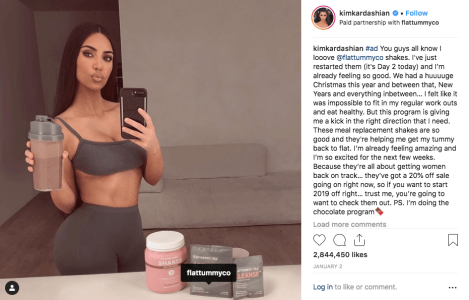An “Influencer” is a person who has the power to affect purchase decisions of consumers via social media because of established credibility in a specific industry or the relationship with his/her audience. Kim Kardashian West, a macro influencer, has 112 million Instagram followers. Most of whose smartphones automatically receive a push notification detailing her every move.
Considering that there are 320 million people in the U.S., her ability to attract 112 million followers is quite impressive. In 2018, The Council of Fashion Designers of America presented her with their first-ever “Influencer Award,” for her “impact on fashion and social media.” In addition, in 2018, Kim made $100 million in revenue from her KKW beauty line, her reality show and multiple endorsement deals, bringing her net worth to a staggering $350 million dollars. Not bad for a community college drop out.
Influencer marketing across all social platforms – – Instagram, Twitter, Facebook, YouTube – – has expanded exponentially. Consumer goods companies have learned that utilizing the right influencer is a way to reach a new audience, raise brand awareness and increase their bottom line.
But as with all good things, there are hurtles. The Federal Trade Commission (“FTC”) has implemented strict rules requiring influencers to disclose if they are being paid to endorse the products on their social media pages. Unfortunately, not everyone is paying attention.
In 2016, Creaxion Corporation secretly paid two Olympic gymnasts “several hundred thousand dollars” to tout FIT Organic Mosquito Repellant on their social media accounts. Each posted social media endorsements of the FIT product but did not disclose that it was a paid partnership, landing Creaxion and its CEO in hot water with The FTC. The FTC accused the company of false or misleading endorsement claims, deceptive failure to disclose material connections with endorsers, and deceptively formatted advertising. In the end, Creaxion entered into a settlement with the FTC requiring at least 10 years of monitoring and government reporting – – which won’t be cheap to comply with.
The Food Lawyers® Analysis: The FTC is widening their enforcement net. Their first step is sending an “Educational Letter” telling the influencer that he/she is on the FTC radar. Recent recipients of “Educational Letters” include Hollywood heavy weights Ellen DeGeneres, Paris Hilton, Lindsay Lohan, rapper Nicki Minaj, actress/singer Naomi Campbell, Jersey Shore’s Nicole “Snooki” Polizzi, makeup artist Madeleine Rose, hip-hop artist DJ Khaled and musician Meghan Linsey.
No one is immune, and every industry – – including food – – needs to be on alert. The FTC has sanctioned both the sponsoring company and the influencer when undisclosed payments have been uncovered.
Kim Kardashian didn’t need to a college degree to know how to play the game. Today, this top influencer commands upwards of $25,000 for each sponsored post and always uses #ad in its caption. The potential to reach an audience in the millions and a high return on investment have consumer brands chomping at the bit. Just remember: If you’re paying Influencers to rant and rave about your product on their social media platforms, it needs to be disclosed. The FTC is cracking down on secret payments to influencers. Everyone is on notice.

